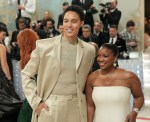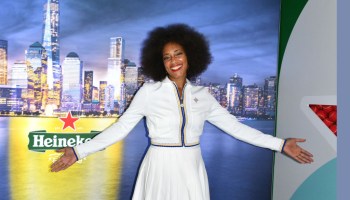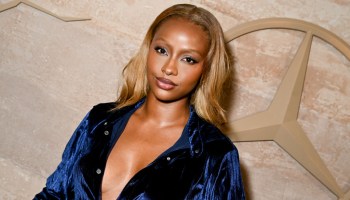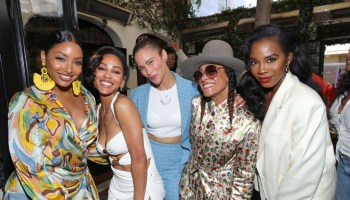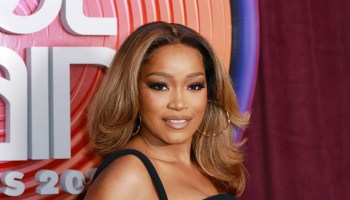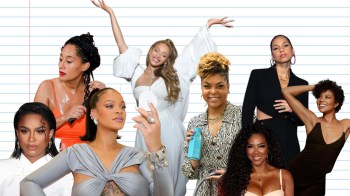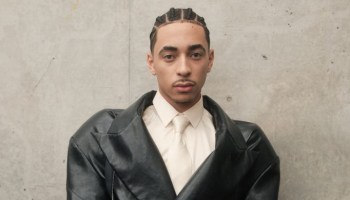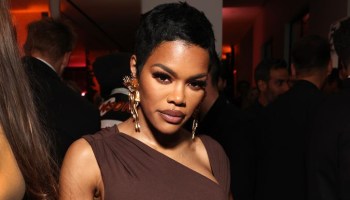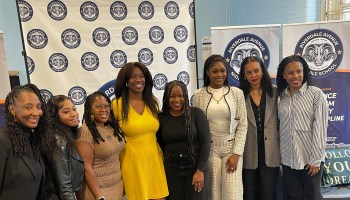Quick pop quiz –name the last time you saw an epic Black female biopic on the big screen? Since Angela Bassett’s Oscar-nominated “What’s Love Got To Do With It?” Black women’s stories seem to be almost invisible. But with the arrival of “Belle,” director Amma Asante has finally given us a heroine worth rooting for.
“Belle” is based on the incredibly true story of Dido Elizabeth Belle, the mixed-race daughter of an 18th Century Royal Navy Admiral and a former slave. When her mother dies, Belle is raised by her uncle and aunt, the Lord and Lady Mansfield. While Belle is raised with all the wealth and benefits of privilege of her station, she is rejected by London high society because of her skin color. When Belle meets the handsome and dashing John Davinier (Sam Reid), the beautiful aristocrat begins a journey of self-love and political activism when Davinier tells her about the horrifying Zong Massacre- 134 slaves thrown overboard a slave ship in order to collect on the insurance money. Belle learns to accept her mixed race heritage and her stance to stand on the right side of history will influence her uncle to bring an end to slavery in England.
The Urban Daily sat down with Asante and lead actress Gugu Mbatha-Raw to discuss the making of the film, why Belle’s story is relevant to the history of slavery and why this year just might be the “Year of The Black Woman.”
TUD: How much did you know about the transatlantic slave trade growing up in England?
Amma Asante: I think I knew a good amount. I’m at that age where I saw “Roots” from a very young age. My sister was quite political as a young woman; she was reading some pretty grown up stuff at 16 years old. So I knew quite a lot. What I did not know – what I learned from my research coming to telling this story and creating this story is that you could make money through killing human beings. I knew you could make money through selling them. What my stomach still can’t cope with is that you could kill them for the insurance money.
Gugu Mbatha-Raw: I knew nothing really. At school we didn’t study it, and in the UK, I guess it’s such a different cultural legacy from the U.S. For me, it wasn’t taught in schools when I was there. I remember seeing “Amistad,” Steven Spielberg’s film. That was one of the first films I’d seen that explored the Middle Passage crossing and that whole concept of the slave trade. So for me, finding out about the Zong case and the real history behind it was really intriguing and I thought why don’t we know about this? This is a story that needs to be told, especially from Belle’s perspective. A story told through a woman’s eyes and a woman of color who is not being brutalized. She is actually educated and inspiring and I just thought it was a very refreshing voice to tell a story from.
The film tackles so many weighty topics like racism, classism and sexism. What was the challenge in balancing all these themes and still produce a compelling drama?
Amma: For me it was about the painting of Belle and her cousin Elizabeth, and when I looked at it, I saw a combination of politics, art and history. That was the starting point of intertwining those three things. Then you bring in identity, gender, race and the idea of where one belongs then some more detailed thematic questions. It was about starting from the beginning and layering each one of those topics almost as if they were characters in themselves, and feeding them through from beginning to end, and taking those themes on their own journey.
If you look at Belle as the tree trunk, everything else are the branches that come stem from her. All of the people in her life represent themes that have to do with her story. Elizabeth represents the gender issue, Davinier represents the moral issue and Lady Mansfield represents the maternal issue. It was constantly balancing the micro and the macro – the big themes with a capital T versus the smaller themes with a little t.
One of my favorite scenes is when Belle is having trouble combing her hair and the Black housekeeper, Mabel, shows her how to do it correctly. How did that scene come about?
Amma: It came about because I was thinking about the legacy of maternal love and what our mothers pass on to us. What happens when you live in a world where the woman who is taking care of you doesn’t look anything like you? I was also thinking about the things we take for granted in a way, the things that our mother’s teach us. What is the thing that is fundamental to us as women of color? It’s our hair, and from a very young age we are taught how to deal with our hair and it usually comes from a mother or an aunt or someone who is very close to you. My niece is of mixed race. Her mother is White but couldn’t teach her that because she didn’t have that experience, so it came from my brother. So my brother is teaching this six year old girl to comb her hair, showing her to start from the ends. Watching my brother and his daughter made me think, “I want to express this experience so the girls of colors in the audience will understand it on a very surface basic level.” But also on a deeper level this is about maternal legacy. That’s why Belle is so sad because even though Mabel may be lower than her in status, Mabel had her mother You can’t put a value on that.
Gugu, as a biracial child being raised by a White mother could you relate to Belle’s hair struggles?
Gugu: I’ve never chemically treated my own hair. I’ve had it blow-dried and straightened it out with straightening irons. But in my personal life I just let it do its thing. I’ve always tried to embrace it, and I think that’s something that my mom instilled in me. Luckily it’s quite manageable, so it’s not like I’ve have had to fight with my hair. I’m quite happy just to be natural.
As Americans we tend to fetishize the “sophistication” of British culture, but in “Belle” we see the ugliness of racism in high society London. There’s an especially frightening scene between Belle and James Ashford (Tom Felton).
Gugu: Yeah, there’s a few ugly scenes, and the first one probably being the scene in the mirror where Belle is pulling at her skin. That to me was really so integral to understanding her inner dilemma, and how uncomfortable she is with her skin at the beginning of the movie. And the scene with James Ashford is really important because this whole film exists in a very genteel society. It’s very refined. But that is not to say that there is not some dark ugly stuff just beneath the surface. And that comes across in Dido’s self-harming scene, as well as the Zong case. I mean over 130 slaves thrown overboard intentionally? That’s very dark. With the James Ashford character, there’s that bestial moment where he grabs her and does God knows what to her. You get to see that inner battle between exoticizing someone and desiring them in a sexual way, but he’s also repulsed by her because of his conditioning. That’s not how he should feel. That’s the argument that we put across in the film. What should win? What your soul tells me to do or what society labels me to be?
“Belle” is a rarity in Hollywood – a movie starring a woman of color, written and directed by Black women. Do you feel that Amma and screenwriter Misan Sagay brought a certain knowledge and experience that perhaps a White director or screenwriter could not?
Gugu: I would say possibly yes, and particularly speaking for Amma, who I worked with most intimately. She directed us in a way where she used personal experience from her own life and her own relationships with the father/daughter relationship or just moments of discrimination and the subtleties and the nuances of racism that happen daily in seemingly in PC society. The little slips that come out here and there. So absolutely, I think it made a difference to have a woman of color’s voice and the perspective Amma brings to the film; from the shots that she chooses and focusing on Belle as the protagonist.
Last week, Lupita Nyong’o was on the cover of People’s Most Beautiful issue and Beyonce made the cover of Time 100. Do you feel mainstream media and the world at large are turning a corner in how they view Black beauty and Black female achievement?
Gugu: Absolutely! I feel like with a film like “Belle,” even the poster is a testament to seeing a woman of color front and center. I think it’s a really inspiring time. I’m really thankful for trailblazers like Beyonce to get the ball rolling. Making women of color visible for their talents and also their brilliance
Amma: A few days ago I watched “The Butler” and “Twelve Years a Slave” and started to to weep, because I saw this great tapestry in our history was being woven on the screen, and “Belle” was going to be a part of that in some way. But it made me sad because I thought iss this a phase, a fad in the way that Africa was Hollywood’s muse a few years ago. Everybody was making a movie in Africa – “Blood Diamond,” “Constant Gardener,” etc. We wondered then at that point, what difference that was going to make and whether we were turning a corner. Someone then said something to me ‘Yes, but every time we go through one of these phases it leaves a residue.” And that residue is an important one. So whether we are going through to actually turning a real corner, which I do truly believe we are, or whether it’s another fad or fashion, it’s going to leave a residue, which you will never be able to get rid of. It will stay, and it’s creating a platform for the next time around.
I do believe there is a kind of momentum that’s building now. It’s really for us to seize it. Not just us as people of color, but for the world. If we want to change the world, then we have to change the way we do things. People of color have to go and see movies that have people of color in them. They have to support those movies. So, it’s about us kind of leveraging the momentum, I think, and not letting it become a fad or a fashion that only leaves a residue, but actually pushes us around that corner, and leads us to the next stage of our evolution.
“Belle” opens in theaters Friday, May 2nd!
VIDEO: Go Behind The Scenes With The Cast of “Belle”
READ MORE:
Reg E. Cathey On “House of Cards,” The N-Word and Usher [EXCLUSIVE]
Nicki Minaj Is An Expert Homewrecker In ‘The Other Woman” [VIDEO]
“Brick Mansions”: Is RZA’s Character The New Nino Brown? [EXCLUSIVE VIDEO]








